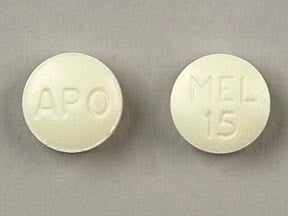
Mobic Coupons & Savings Card – Discount Prices from $3.15
Brand for: Meloxicam
My prescription
Edit
15MG, Meloxicam (30 Tablets)
Select pharmacy

CVS
$18.93
COUPON PRICE
Walmart
$3.15
COUPON PRICE
Walgreens
$9.65
COUPON PRICE
Albertsons
$12.76
COUPON PRICEMobic savings card
Show this card to your pharmacist
Walmart
$3.15
BIN
ID
PCN
GRP
019876
LH84902294
CHIPPO
LHX
Powered by
More prescriptions for rheumatoid arthritis
More prescriptions for rheumatoid arthritis
Mobic (Meloxicam) dosage forms
Dosage Quantity Price from Per unit 7.5MG 10 Tablets $2.71 $0.27 7.5MG 14 Tablets $2.79 $0.20 7.5MG 15 Tablets $2.82 $0.19 7.5MG 30 Tablets $3.13 $0.10 7.5MG 60 Tablets $3.76 $0.06 7.5MG 90 Tablets $10.89 $0.12 7.5MG 180 Tablets $18.07 $0.10 15MG 30 Tablets $3.15 $0.10 15MG 7 Tablets $2.65 $0.38 15MG 10 Tablets $2.72 $0.27
| Dosage | Quantity | Price from | Per unit |
|---|---|---|---|
| 7.5MG | 10 Tablets | $2.71 | $0.27 |
| 7.5MG | 14 Tablets | $2.79 | $0.20 |
| 7.5MG | 15 Tablets | $2.82 | $0.19 |
| 7.5MG | 30 Tablets | $3.13 | $0.10 |
| 7.5MG | 60 Tablets | $3.76 | $0.06 |
| 7.5MG | 90 Tablets | $10.89 | $0.12 |
| 7.5MG | 180 Tablets | $18.07 | $0.10 |
| 15MG | 30 Tablets | $3.15 | $0.10 |
| 15MG | 7 Tablets | $2.65 | $0.38 |
| 15MG | 10 Tablets | $2.72 | $0.27 |
| 15MG | 14 Tablets | $2.80 | $0.20 |
| 15MG | 15 Tablets | $2.83 | $0.19 |
| 15MG | 90 Tablets | $10.96 | $0.12 |
Is Mobic a strong painkiller?
Mobic, also known as meloxicam, is not classified as a strong painkiller. It is a nonsteroidal anti-inflammatory drug (NSAID) used to relieve pain and inflammation associated with conditions like arthritis. It is effective for mild to moderate pain but is not as strong as opioid painkillers.
Is Mobic 15 mg a narcotic?
Mobic 15 mg is not a narcotic. It is a nonsteroidal anti-inflammatory drug (NSAID) used to relieve pain and inflammation.
Is Mobic an opioid?
Mobic is not an opioid. It is a nonsteroidal anti-inflammatory drug (NSAID) used to relieve pain and inflammation.
Is it okay to take tramadol and meloxicam together?
It is generally considered safe to take tramadol and meloxicam together, as they work through different mechanisms to relieve pain. However, it is important for the individual to consult with their healthcare provider before combining these medications, as there may be specific health considerations or potential interactions based on their personal medical history.
Is meloxicam a painkiller or muscle relaxer?
Meloxicam is a nonsteroidal anti-inflammatory drug (NSAID) used to relieve pain and inflammation, particularly in conditions like arthritis. It is not a muscle relaxer.
